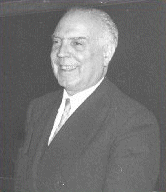
Vasco Ronchi was born in Florence, Italy, in 1897, He died on October 31st, 1988, at the age of 91. He graduated in physics at the Scuola Normale Superiore in Pisa. At the age of 18, Ronchi entered the armed forces, serving during World War I.
After the war, a laboratory for optics and precision mechanics was established, and then, in 1926, was transformed into the National Institute of Optics, under the direction of the young Vasco Ronchi who immediately set to work to meet and solve the early problems - lack of space, of texts, of equipment, and, above all, of an adequate and properly trained staff. All the leading scientists in the field of optics in the next half century spent time at this Institute.
Ronchi's most valuable scientific contribution is the well known Ronchi Test. Its low cost and the fact that it is very easy to apply and interpret mean that this test can be used in laboratories that do not have special equipment.
Ronchi's career was dedicated to three main objectives. The first was the dissemination of optical information in every area of human activity: in industry and medicine, in commerce, in architecture, in teaching at all levels.
The second important interest was the history of optics. Among Ronchi's early works is an analysis of a lens made by Torricelli and of the first telescopes of Galileo. Because of his studies in this field, Ronchi was president of the Union Internationale d'Histoire et Philosophie des Sciences of UNESCO for fifteen years, from 1956 to 1970. He was also awarded the Légion d'Honneur by the French Government.
His third field of activity was in the field of physiological and psychological optics; this was motivated by the importance of physio-psychological processes in vision, and in the design and use of instruments.
The dominant concern of Ronchi's later years was philosophical speculation on the basic nature of optics. His challenging theory, described in his last book "Genesi del Mondo Apparente" (edited by Olschki, Firenze, 1986) has generated much controversy, and has aroused large international scientific interest.
In 1975, at the age of 78, Ronchi retired from the direction of the Institute which he created in 1926. Always active, he continued up to the end to direct the Fondazione Giorgio Ronchi, established in 1946, in memory of his son, killed at the age of 13 on the last day of fighting in Florence and to publish the Atti della Fondazione Giorgio Ronchi to organize cultural activity both in Florence and in Villa Malaparte in Capri (Italy), to lecture and publish in the vast domain as practical and theoretical optics, fighting againt errors, prejudice and ignorance wherever he found them.
